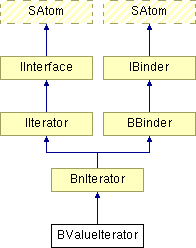
#include <support/Iterator.h>
Inheritance diagram for BValueIterator:

Public Member Functions | |
| BValueIterator (const SValue &value) | |
| virtual status_t | Next (IIterator::ValueList *keys, IIterator::ValueList *values, uint32_t flags, size_t count=0) |
| Return a batch of keys and values from the iteration. | |
| virtual SValue | Options () const |
| The iterable options that are in force for this iterator. | |
| virtual status_t | Remove () |
Protected Member Functions | |
| virtual | ~BValueIterator () |
|
|
|
|
|
|
|
||||||||||||||||||||
|
Return a batch of keys and values from the iteration.
The iterator may return key/value pairs, or single values. If returning single values, by the SValue mapping rules the key should always be B_WILD_VALUE. The Next() method can be given a flags parameter. Like INode::Walk(), you can supply REQUEST_DATA and COLLAPSE_NODE in the function's flags, with the corresponding semantics for the values the iterator returns. Also like INode::Walk(), the iterator is free to ignore these flags. Implements IIterator. |
|
|
The iterable options that are in force for this iterator. You can use this determine which of the arguments given to IIterable::NewIterator() are in force for this iterator, and in what way. These are the same form as the arguments supplied to IIterable::NewIterator(). Implements IIterator. |
|
|
|